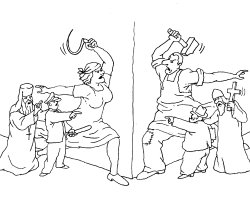TOWARD CONSOLIDATION AND WELL-BEING THROUGH MUTUAL FORGIVENESS AND RECONCILIATION

In addition to grave economic and political problems, Ukrainian society suffers from social, ethnic, and particularly interfaith discord.
A closer look at Ukrainian history shows that internal strife dates from the times of Kyiv Rus’. In fact, historians often refer to this as a trait inherent in the Ukrainian mentality. Conflicts and feuds were always used by external enemies. By applying the old principle of divide and rule this enemy played brother off against brother and neighbor against neighbor, exploiting their social, ethnic, or confessional distinctions.
We know from history about the fratricidal war that broke out in Ukraine in the first half of the sixteenth century for reasons purely religious. Under Bohdan Khmelnytsky, such discord turned into a ruthless senseless interethnic and interfaith confrontation. In addition, the Haidamak rebellion (1768), evolved into a social and religious war between residents of Ukraine adhering to different creeds. All this eventually resulted in Ukraine’s losing its cherished freedom and national independence.
Ukraine entered the revolutionary years of 1917-20 already disunited, including the distrust between the rural Orthodox Eastern populace and residents of ethnically and religiously heterogeneous cities, then considerably Russified. This conflict, which led to the bloody and suicidal anarchy of the otamanshchyna, wars among various local warlords, led to the defeat and discrediting of the very idea of the Ukrainian national democratic revolution.
In a way, we are also historically responsible for those fratricidal hostilities, particularly under the totalitarian regime. This responsibility is a heavy burden, a formidable obstacle in building a Ukrainian nation state, as old animosities often revive. I think that only clear awareness, a sober analysis of past tragedies, as well as sincere mutual repentance can provide conditions in which we will cleanse ourselves spiritually, for the entire nation to be cured and reborn.
Logically, the Ukrainian Church must be the organizer, ideologue, and dedicated executor of this process of repentance, forgiveness, and reconciliation. How well are our shepherds prepared for this mission? Will they cast aside their differences, mutual accusations, and proceed to discharge their functions in jointly serving our Lord and our people?
It also seems worth reminding oneself that a highly developed, powerful civilization and culture emerged and matured on the dynamic ideological principles of Western Christianity, and that postcommunist countries traditionally oriented toward those same cultural and spiritual values are now demonstrating comparatively the most effective methods of overcoming the vestiges of totalitarianism. At one time Ukraine, too, was open to extensive economic, cultural, and spiritual exchange with the Christian East and West. Ukraine was then placed worthily among the most advanced countries of medieval Europe and the world. Is it not high time that we embark on that road?
Drawing by Anatoly Kazansky, The Day






